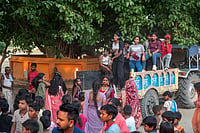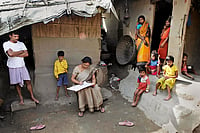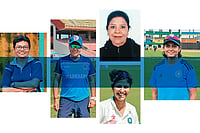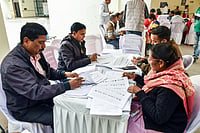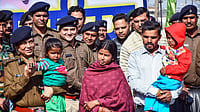Dinesh Majhi, 24, lives in a tribal-dominated village in Simdega district of Jharkhand. The family of seven —Majhi’s parents, one brother, three sisters—has always struggled to make ends meet. They have a small paddy farm, but owing to erratic weather conditions in the past few years, it has become a liability. The family now has to depend on the ration provided by the government.
Majhi is the eldest among his siblings but he is not able to contribute to the family’s meager earnings after he sustained an injury that has forced him to stay at home. Owing to their poor economic condition, their maternal uncle took two of the sisters —Anita and Vinita— to Delhi. While Anita was taken in 2020, when she was 17, Vinita followed two years later when she was 15. Both the sisters were handed over to an agent, who placed them as domestic help.
While Anita did not face any issues, for Vinita, the Delhi stint was a nightmare and she is back home now. “The first family treated me nicely. They would give me money. But the second experience was bad. Madam used to beat me up with a belt. There are burn injuries on my hands. They used to make me work till 3 AM and expected me to be up at 6 AM. They broke my mobile into pieces,” says Vinita.
For the five months that she worked there, she was not paid a penny. After some neighbours heard her cries while she was being beaten up, they contacted the Delhi Police, who, in turn, informed the Simdega District Collector. After the matter reached Jharkhand Labour Department’s State Migrant Control Room, the process of Anita’s rescue started.
Poverty and human trafficking in Jharkhand
While poor economic conditions forced the Majhi family to send their daughters away, there are many families like the Majhis in Jharkhand who because of unemployment and poverty are forced to take such extreme steps.
As per the first report of the National Multidimensional Poverty Index of NITI Aayog, published in 2021, 42.2 per cent of people in Jharkhand are poor. The state ranks second after Bihar.
Many families are forced to move out to look for work. Some of these families end up becoming victims of human trafficking. According to the latest figure of the National Crime Records Bureau (NCRB), Jharkhand is among the top-ten states in the country which account for 81.4 per cent of the total human trafficking cases in the country.
According to the state Criminal Investigation Department (CID), out of the 656 cases registered with different police stations in Jharkhand between January 2017 and December 2022, 1,574 people were victims of human trafficking. Out of the 1,473 who were rescued, 1,001 are women. So far, 783 traffickers have been arrested.
Interestingly, according to the Jharkhand Department of Women and Child Development & Social Security, out of the total number of girls who were rescued, in 90 per cent of the cases, they were sent to bigger towns and cities to work as domestic helps along with their alleged traffickers only after receiving consent from their parents.
Among those who migrate to different parts of the country for work includes a significantly large number of tribals from rural pockets of Jharkhand.
According to a report by Dr Ramdayal Munda Tribal Welfare Research Institute (TRI), 90 per cent girls who are victims of human trafficking are tribals. Most of the girls are sent to Delhi, Hariyana and Punjab and are trafficked to work as domestic help. They are sold and bought through placement agencies in these states.
Rescuing victims of human trafficking
With the help of the State Migration Control Room of the Jharkhand Labour Department, from 2020 until now, 41 tribal girls have been rescued. Among these are Lilawati Oraon and Mira Kumari. Due to unemployment and extreme poverty, these two had to leave home when they were minors.
Lilawati Oraon, 24, hails from a village in Gumla district. When she was 12, she and her mother went to Delhi to work as house help for one of their acquaintances. But both were placed in separate households. Oraon was not allowed to meet her mother. She ran away and stayed at an ashram until she was rescued in May this year.
Mira Kumari, 31, is also a tribal. When she was 13, she went to Gorakhpur in Uttar Pradesh with her father to work at a brick kiln. However, within a week, she was trafficked to Nepal via Panchkula in Haryana. When the Jharkhand government came to know about it, she was rescued from Nepal in November 2022.
Those children from Jharkhand who are working in different parts of the country were helped by their acquaintances or relatives.
An officer from the Department of Women and Child Development & Social Security, Jharkhand, says on the condition of anonymity: “Most of the girls who are trafficked are very innocent. They are lured to go out. In most cases, the parents are initially given some money and are promised that they will be sent money every month, which never happens. Most of these families are tribals belonging to poverty-stricken families.”
According to police records, between 2015 and 2022, 1,902 boys and 2,863 girls, all minors, are reported to have gone missing. So far, 3,997 boys and girls have been rescued.
Baidyanath Kumar, secretary, Child Rights Foundation, who has worked with around a dozen NGOs associated with the issue of child rights, says: “I have been working for the issue of child rights for the past 20 years. I have found that in most of the cases, the missing children have been trafficked. Till now, around 5,000 children have been rescued.”
With the help of police, Kumar has got 116 traffickers arrested who were running a network of human trafficking from Jharkhand to Delhi. “Trafficking is a big problem in Jharkhand. The government does not seem very successful in clamping down the problem of trafficking. It should come up with stringent laws to put an end to this issue,” says Kumar.
In Jharkhand, at 300 police stations, there are women help desks and every district has an anti-human trafficking unit. Anurag Gupta, the DG of Jharkhand CID, says: “Awareness drives are being carried out at several levels to stop human trafficking. There are many placement agencies operating in Delhi and other big cities and towns. Girls from states like Jharkhand, Odisha and Bengal are directed to them and they place them as domestic help.”
Gupta also says that there are many NGOs that harass people on the pretext of child security. They forcefully make the children give statements. These people who rescue children and bring them back never revisit or ask about their well-being.
(All names have been changed on request)
Translated by Kaveri Mishra



















